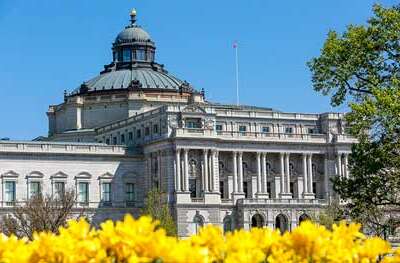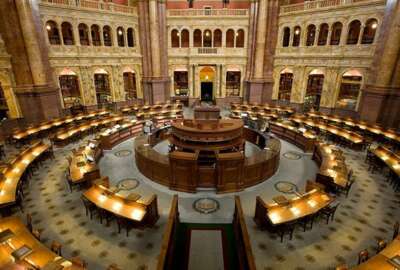

For what it's all about, Federal Drive with Tom Temin turned to the the director of the Law Library editorial and publishing office, Luis Acosta, and law library...
Best listening experience is on Chrome, Firefox or Safari. Subscribe to Federal Drive’s daily audio interviews on Apple Podcasts or PodcastOne.
The Library of Congress just launched a new crowdsourcing campaign to expand access to unreleased Law Library documents dating back to the World War II era. For what it’s all about, Federal Drive with Tom Temin turned to the the director of the Law Library editorial and publishing office, Luis Acosta, and law library senior legal information specialist, Stephen Mayeaux.
Interview transcript:
Tom Temin: We turn to the director of the law library editorial and publishing office. Luis Acosta. Mr. Acosta, good to have you on.
Luis Acosta: Good morning. Thanks for having me.
Tom Temin: And Law Library senior legal information specialist, Stephen. My you, Mr. Ma, you. Good to have you on.
Stephen Mayeaux: Good morning. Thanks for having me.
Tom Temin: Alright. So let’s begin with the context here. Mr. Costa, what are the types of documents and extent of the documents are involved in this campaign?
Luis Acosta: Well, so just by way of background, the Law Library of Congress has for really over a century now been doing reports on foreign law for Congress and for other, you know, federal agencies sometimes as well. They’re somewhat similar to the reports that are more well known sister agency, the Congressional Research Service does, when it’s a question from Congress comes into the Library of Congress. That’s about foreign law, the folks in the law libraries foreign law division, which is called the Global legal research Directorate, will be assigned to respond. And that’s just sort of a historical just the result of how things developed. The foreign law specialists are at the law library because they handle collections responsibilities, as well as research responsibilities. So foreign law questions come to the Law Library of Congress. We’ve been doing these for, like I said, over a century, but I really picked up around the post World War II era – and now we’re digitizing these.
Tom Temin: Got it. So Stephen, in other words, these are not available widely. They’re all in paper. So you’re digitizing them, then tell us what the issue there is that you need a crowdsourcing campaign for?
Stephen Mayeaux: Sure. As Luis said, we’ve been writing these reports for decades now. And in fact, many of them have already been added to the collection. But since about 2018, we started the project to inventory. Many of these historical paper reports that were not formerly part of the collection, as well as a few that were what we thought would benefit from digitization. But many of these reports have been digitized from thin carbon copies, kind of like onion skin paper. And in some cases, these represent the only known remaining versions of the reports. So although they’re still pretty legible to the human eye, the poor print quality makes their digitized characters difficult for optical character recognition or OCR. And that’s why we enlisted the help of volunteers for this particular campaign.
Tom Temin: And so you don’t want to post just images of the fuzzy pages, you want to have the actual text available.
Stephen Mayeaux: Exactly. Our goal is to have a fully searchable and accessible collection of these historical reports.
Tom Temin: And what will the volunteers do then precisely?
Stephen Mayeaux: Well, if you’re familiar with the platform, this is the by the people crowdsourcing platform, and I invite anyone listening to go to crowd.loc.gov, you would see an image on your left screen of the digitized report. And then on the right side of your screen, you’ll have a transcription window. And we are asking volunteers to type what they see. And in fact, in this particular campaign, we have been successful enough to have an initial transcription of nearly all of the pages and all but maybe 10 or so pages have received an initial transcription. So what we need now are reviewers who are willing to go in and look at the transcription and confirm its accuracy and accept it. And at that point, it becomes added to the library’s permanent collections.
Tom Temin: Got it. We’re speaking with Stephen Mayeaux, he’s senior legal information specialist, and with Louis Costa, director of the law library editorial and publishing office, they are both with the Library of Congress. And do people that do this comparison need to simply be good readers, or do they have to have some knowledge of law for example?
Stephen Mayeaux: Thank you for asking that. They do not need to have any knowledge of law. Anyone who is able to read the content in the image is welcome to participate. In fact, there are magnifying tools where you can zoom in and out. So we hope that many of these characters are easy enough to read. And in fact, we’re looking for readers of languages for a small selection of these reports, which are foreign language translations of the US Constitution. So if you’re a speaker of Armenian, Chinese or Russian, Korean, even maybe Hungarian, we are looking for those who can help us review those particular documents as well.
Tom Temin: And Luis from a content standpoint, I’m looking at a couple of pages here that have just at random having to do with visas for travel to Burma, I guess for a Burma shave in 1966. I’m dating myself, sorry. And there are scribblings in some of the margins. There is a recurring footnote at the bottom of each page. I mean, this is when typists were really typists when these were created way before computer generated text. Is there any significance into what might be in some of the handwritten notes? Or in the footnote can be reproduced just on the first page? And I mean, how does the formatting affect the content? And is the formatting need to somehow get moved forward in this effort?
Stephen Mayeaux: As I said earlier, in some cases, these are the only remaining copies of the report. So it’s possible that maybe this 1966 report was published in another format. But the one that we have the one remaining copy may have handwritten notes, and we invite volunteers to transcribe those in brackets as marginalia. So that will become part of the transcription of the report.
Tom Temin: Got it. And Luis?
Luis Acosta: One never knows what a researcher who happens to be researching the situation in Burma in 1966 might find of interest. So it’s too much for someone developing a collection to assume what future researchers might find interesting for one reason or another. So even such marginalia conceivably could be of interest.
Tom Temin: Yeah, so that can get some help move forward into the digital age, even the margin notes. Exactly. And what about the situation say, continuing with the Burma example, it’s now called Miramar? And is there some way for someone to if they’re interested in Myanmar, to be directed toward a document referring to Burma?
Stephen Mayeaux: I can answer that I think. As far as I understand, this particular report, should have a catalog record. Another thing worth mentioning about this project is that it’s a collaboration between us and GPO. The US Government Publishing Office receives these records and they provide full bibliographic records. So they would have applied a subject term to the record for this particular report, which would link Burma and Myanmar. So a researcher would, by accessing the bibliographic record, be able to find other reports.
Tom Temin: Alright, so let’s zoom out here. Again, you’ve got this interesting thousands of documents and collections that are going to be verified, and some degrees still to be transcribed, but mostly verified. To whom might the collection be of interest do you think in the future?
Stephen Mayeaux: I think that this project presents the opportunity to engage new audiences with the works that have been written by the law library over many decades, I think our hope is, is that it would expand digital access, not only for legal historians, but also policymakers, scholars, foreign legal specialists, who currently refer to contemporary law library ports, but also students of history and public policy, government or international relations, as well as just the general interested members of the public.
Tom Temin: And Luis what is fascinating to you about this publication and this collection that might be interesting to the general public out there?
Luis Acosta: Well, as Stephen mentioned, I think this would be of interest to historians, political scientists, also people who are interested in the history of the federal government and indeed the history of the Library of Congress. Anyone interested in the history of international relations, what the US government was interested in during that time period in question? Yeah, historians of the Cold War. Any number of historians and scholars might find these materials of interest.
Tom Temin: Alright. Luis Acosta is director of the law library editorial and publishing office at the Library of Congress. Thanks so much for joining me.
Luis Acosta: Thank you.
Tom Temin: Stephen Mayeaux is senior legal information specialist at the Library. Thanks so much.
Stephen Mayeaux: Thanks a lot.
Copyright © 2025 Federal News Network. All rights reserved. This website is not intended for users located within the European Economic Area.
Tom Temin is host of the Federal Drive and has been providing insight on federal technology and management issues for more than 30 years.
Follow @tteminWFED


